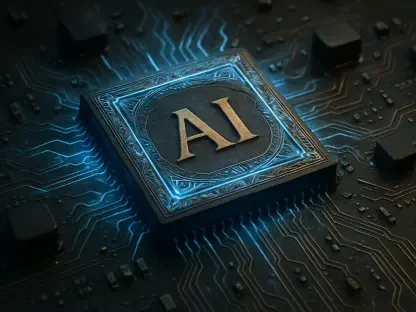As technological advancements continue to shape modern industries, the integration of smart sensors in control systems proves pivotal for enhancing efficiency, safety, and decision-making capabilities across various sectors. Unlike traditional sensors, smart sensors incorporate microprocessor units and communication tools within their design, allowing them to perform data analysis internally. This enables control systems to operate with minimal human intervention, facilitating automated processes and real-time data management. From industrial automation to healthcare monitoring, smart sensors significantly impact how systems operate and adapt to dynamic environments, emphasizing their critical role in the ongoing digital transformation.
The Role of Smart Sensors in Industry 4.0
Innovative Technologies Boosting Industrial Automation
Smart sensors drive the transformation in industrial automation by empowering systems with enhanced capabilities to monitor, analyze, and optimize manufacturing operations. With embedded processors and connectivity features, they enable predictive maintenance, automatic malfunction alerts, and performance assessments for equipment, thereby minimizing downtime and increasing productivity. Through integration with machine learning algorithms, smart sensors adapt to environmental changes, facilitating seamless operations and reduced human error.
In manufacturing facilities, smart sensors are essential for enhancing the precision and efficiency of robotic systems, CNC machines, and automated assembly lines. These sensors can process complex datasets, allowing for instantaneous decision-making and self-calibration in data-intensive environments. The implementation of IoT protocols and wireless connectivity further enriches the communication capabilities of smart sensors, enabling real-time data sharing and integration into the control systems, ensuring streamlined operations even in remote locations.
Challenges in Adopting Smart Sensors in Industry
Despite the numerous benefits that smart sensors offer, their adoption in industrial settings faces challenges such as cybersecurity risks, standardization issues, and high initial costs. As these devices become increasingly interconnected, the threat of cyberattacks becomes more pronounced, necessitating robust encryption and security protocols to protect sensitive data. Ensuring data privacy and integrity is paramount to maintaining the reliability of industrial automation systems.
Furthermore, the lack of common standards across smart sensor devices presents interoperability challenges among equipment from different manufacturers. Establishing standardized communication protocols is essential for seamless integration and efficient operation. Initial costs can also deter small and medium-sized enterprises from adopting these technologies, despite the long-term cost reductions they can provide. Addressing these financial barriers and standardization issues is crucial for facilitating wider adoption and maximizing the potential of smart sensors in industrial automation.
Advancements in Building Automation and Smart Cities
Smart Sensors Revolutionizing Building Management Systems
Building automation systems are experiencing a significant transformation with the integration of smart sensors, which enhance the functionality of HVAC, security, and lighting systems. These sensors offer precise control over energy consumption and environmental conditions, optimizing energy usage and reducing costs. In modern smart homes, occupancy sensors regulate building usage, ensuring energy is conserved efficiently while maintaining optimal indoor conditions.
Thermal regulators equipped with smart sensors provide detailed environmental data integrations, allowing for real-time adjustments in heating and cooling systems based on external conditions. This intelligent operation of building systems contributes to improved energy efficiency and sustainability, aligning with global environmental goals. Additionally, smart security systems utilize these sensors to detect motion, unauthorized access, and security breaches, improving safety and responsiveness in buildings.
Enhancements in Smart City Infrastructure with Sensors
Smart cities use smart sensors to revolutionize traffic management systems, optimizing the flow of vehicles and pedestrians through adaptive traffic lights and road sensors. These sensors collect real-time data to strategically manage traffic conditions, reducing congestion and improving safety. By integrating IoT protocols and wireless connectivity, smart city infrastructure can share data between various systems, enhancing coordination and efficiency.
Beyond traffic management, smart sensors play a crucial role in environmental monitoring within urban areas. They provide insights into air quality, pollution levels, and noise pollution, aiding city planners in making informed decisions about urban development and environmental policies. The use of smart sensors in smart cities contributes to improved quality of life for residents while supporting sustainable urban growth and resource management.
Smart Sensors in Healthcare and Agriculture
Enhanced Healthcare Monitoring through IoMT
In the healthcare sector, smart sensors advance patient monitoring technology by enabling wearable and remote healthcare devices to track vital signs and medical conditions. Through IoMT (Internet of Medical Things) technology, these devices communicate data in real-time, allowing healthcare providers to make informed decisions quickly and intervene when necessary. This facilitates improved clinical outcomes by ensuring timely responses to emergencies and providing continuous health monitoring.
Wearable devices equipped with smart sensors offer personalized health insights, promoting preventive care and allowing patients to manage their health proactively. These sensors empower healthcare professionals to deliver efficient and accurate care, reducing hospital readmissions and optimizing resource allocation. As healthcare systems continue to evolve, smart sensors are expected to play a pivotal role in enhancing patient-centric care and expanding telehealth services.
Smart Sensor Applications in Agricultural Monitoring
Agriculture benefits immensely from applying smart sensors used to monitor environmental conditions, soil moisture, and crop health. These sensors, alongside drones, provide precise data to assess irrigation needs and detect disease outbreaks in crops. By integrating machine learning algorithms, smart agricultural systems can predict weather patterns, optimize resource use, and improve crop yields through informed interventions.
Environmental sensors offer insights into air quality and water purity, ensuring sustainable agricultural practices and minimizing ecological impacts. The real-time data collected by these sensors enables farmers to make data-driven decisions, enhancing productivity and sustainability in agriculture. As precision agriculture becomes increasingly vital in addressing food security challenges, smart sensors are indispensable for transforming traditional farming into highly efficient and adaptive systems.
Future Outlook and Trends
Edge Computing and Sustainability Initiatives
The future of smart sensors is bright, with market growth expected to expand significantly as demands increase in industrial automation, healthcare, and consumer electronics. One critical trend shaping this growth is the emergence of edge computing, which allows data to be processed locally rather than being sent to centralized cloud systems. This results in faster real-time responses, minimizing latency and optimizing system operations.
Sustainability initiatives heavily rely on smart sensors to drive efficient resource management and environmental compliance. These sensors offer detailed insights into resource usage, waste management, and energy consumption, contributing to global sustainability goals. As organizations aim for greener and more sustainable operations, integrating smart sensors into control systems will become crucial for achieving environmental targets and ensuring future readiness.
Market Growth and Emerging Opportunities
The anticipated rise in demand for smart sensors in various sectors presents numerous opportunities for innovation and expansion. As technology continues to advance, newer applications and functionalities for these sensors are expected to emerge, positioning smart sensors as key enablers of digital transformation. There are also prospects for miniaturization, attributed to MEMS technology, and low power consumption, expanding their applications in wearable health systems and robotic platforms.
Moreover, advancements in AI and machine learning are boosting the capabilities of smart sensors, making them more adept at analyzing extensive datasets, learning from patterns, and improving decision-making precision. The integration of these technologies will pave the way for smarter and more efficient control systems, supporting industries in achieving enhanced automation, sustainability, and operational excellence. The continuous evolution of smart sensors will redefine modern systems, driving progress and innovation across various domains.
Conclusion: Embracing the Future of Sensor Technology
As technological advancements continue to reshape modern industries, smart sensors have become vital components in control systems, markedly enhancing efficiency, safety, and decision-making capabilities across diverse sectors. In contrast to traditional sensors, these smart devices integrate microprocessor units and communication tools, empowering them to conduct internal data analyses. This innovation allows control systems to function with minimal human intervention, paving the way for automated processes and the management of real-time data. Stretching from industrial automation, where they streamline operations by responding instantly to fluctuating conditions, to healthcare monitoring, where they enable constant, precise tracking of patient health metrics, smart sensors are revolutionizing system performance. They adapt effectively to dynamic environments and play a crucial role in the ongoing digital transformation, affecting how industries develop and operate. As businesses strive for heightened efficiencies and greater operational control, the adoption of smart sensors within control systems reflects a substantial shift toward sophisticated, self-regulating technologies that are essential for future progress.









